영자신문읽기[고급] 신문 속 다양한 세상 이야기를 이제 영어로 만나보세요!
Won-yuan trade closer to reality
2014-07-06
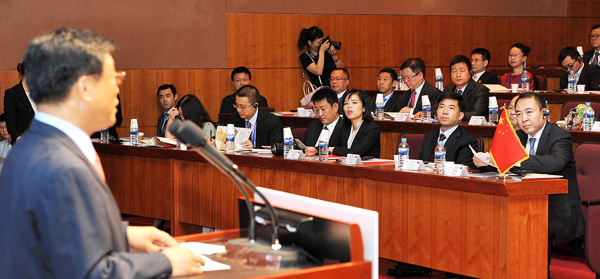
One of the biggest achievements of the Chinese president’s visit to Seoul is that Korea will create a market to directly trade the won and yuan.
The Bank of Korea and the People’s Bank of China yesterday signed a memorandum of understanding to designate yuan clearing banks among Chinese banks operating in Korea.
Allowing the won-yuan exchange is expected to be a huge benefit for exporters in both countries, which will be able to slash currency conversion costs and risks, as well as wealthy Chinese investors interested in cutting-edge Korean technologies and rich Hallyu cultural content.
The structure for direct trading will be created in Korea first, according to a joint declaration by President Park Geun-hye and her Chinese counterpart, Xi Jinping.
The Chinese government will follow suit in the near future based on a phased-in approach in line with changing market conditions. This will also boost internationalization of the Korean won.
Payments in Chinese yuan in global trade are growing significantly, rising 58 percent year-on-year to about 4.6 trillion yuan ($740 billion) in 2013.
Currently, the Australian dollar, New Zealand dollar, Japanese yen and U.S. dollar are directly traded with the yuan.
In response to the rise of the yuan as an international currency, the Korean government decided to designate Chinese banks operating in Seoul as yuan clearing banks.
Korean institutions also will be able to invest 80 billion yuan in China as renminbi-qualified foreign institutional investors, known as the RQFII status. The total amount can be increased in accordance with market conditions.
Direct trading of the currencies is expected to bring about three noticeable effects, according to a Blue House press release.
Exporters of the two countries will save money on exchange and payment commission fees. As a result, trade between the two countries can be expected to expand further due to reduced exchange risks.
Korean financial institutions will get a new business opportunity by developing yuan-related financial products, contributing to the growth of the industry, the press release said. Lessened dependence on the U.S. dollar will also improve Korea’s fiscal health.
Even though China is Korea’s biggest trading partner, about 85 percent of trade between the two countries uses the U.S. dollar, with payments in the yuan accounting for less than 1 percent, according to data from the Korea Exchange Bank.
With the newly created market, Korean commercial banks will be able to sell yuan-dominated bonds or funds.
Direct trading of the won and yuan is expected to increase business opportunities for both countries, too.
“Korea is the most important partner for China,” said Liu Dianxun, director general of the Investment Promotion Agency under the Ministry of Commerce of China, yesterday in front of more than 100 Chinese business leaders who accompanied Xi to Seoul. “Direct trading of the currencies will also increase Chinese investment in Korea’s high-tech technologies.”
Liu and the Chinese business delegation visited the headquarters of the Korea Trade-Investment Promotion Agency (Kotra) in Yeomgok-dong, southern Seoul, yesterday morning to hear about the changing investment conditions in Korea.
Owing to the most favorable atmosphere in diplomatic ties between Korea and China since 1992, many Chinese businesses plan to invest in Korea, said four Chinese business representatives at a separate press conference.
“Even the government is encouraging businesses to invest in Korea, taking advantage of such amicable relations,” said one of the representatives.
Chinese investors are highly interested in cultural content, software and real estate development, according to the representatives.
“Because Korean TV dramas and movies are very popular in China, we plan to make joint investments with Korean producers,” said Luo Xing, president of Beijing Huaxia Hanmo Media.
He said even senior officials of the Chinese government enjoy Korean dramas, and some say the Chinese content industry needs to study Korea to catch up.
“Since last year, we are making a large investment in Jeju,” said Su Bo, president of Macrolink Real Estate, one of the top 500 companies in China. “There were some legal problems that we didn’t understand much, so we requested help from Kotra.”
“We are trying to expand from China onto the global stage, and we are looking at Korea now,” said Song Yao, vice president of Shanghai Shimao, a leading real estate developer. “We visited Jeju last year and plan to build some towns consisting of hotels, shopping malls and leisure facilities. Of course, we will work with several Korean companies.”
Song added the company could make its initial investment this year.
Some Chinese manufacturers also are looking for opportunities to work with Korean companies.
“We want to invest in Korea because of Korean companies’ outstanding manufacturing capabilities,” said Ren You Fa, CEO of Haining China Leather Market, the country’s largest leather producer. “We are looking for Korean partners with whom we can create a joint brand and produce goods together.”
The CEO added he plans to build a large shopping mall similar to Seoul’s Dongdaemun.
The Bank of Korea and the People’s Bank of China yesterday signed a memorandum of understanding to designate yuan clearing banks among Chinese banks operating in Korea.
Allowing the won-yuan exchange is expected to be a huge benefit for exporters in both countries, which will be able to slash currency conversion costs and risks, as well as wealthy Chinese investors interested in cutting-edge Korean technologies and rich Hallyu cultural content.
The structure for direct trading will be created in Korea first, according to a joint declaration by President Park Geun-hye and her Chinese counterpart, Xi Jinping.
The Chinese government will follow suit in the near future based on a phased-in approach in line with changing market conditions. This will also boost internationalization of the Korean won.
Payments in Chinese yuan in global trade are growing significantly, rising 58 percent year-on-year to about 4.6 trillion yuan ($740 billion) in 2013.
Currently, the Australian dollar, New Zealand dollar, Japanese yen and U.S. dollar are directly traded with the yuan.
In response to the rise of the yuan as an international currency, the Korean government decided to designate Chinese banks operating in Seoul as yuan clearing banks.
Korean institutions also will be able to invest 80 billion yuan in China as renminbi-qualified foreign institutional investors, known as the RQFII status. The total amount can be increased in accordance with market conditions.
Direct trading of the currencies is expected to bring about three noticeable effects, according to a Blue House press release.
Exporters of the two countries will save money on exchange and payment commission fees. As a result, trade between the two countries can be expected to expand further due to reduced exchange risks.
Korean financial institutions will get a new business opportunity by developing yuan-related financial products, contributing to the growth of the industry, the press release said. Lessened dependence on the U.S. dollar will also improve Korea’s fiscal health.
Even though China is Korea’s biggest trading partner, about 85 percent of trade between the two countries uses the U.S. dollar, with payments in the yuan accounting for less than 1 percent, according to data from the Korea Exchange Bank.
With the newly created market, Korean commercial banks will be able to sell yuan-dominated bonds or funds.
Direct trading of the won and yuan is expected to increase business opportunities for both countries, too.
“Korea is the most important partner for China,” said Liu Dianxun, director general of the Investment Promotion Agency under the Ministry of Commerce of China, yesterday in front of more than 100 Chinese business leaders who accompanied Xi to Seoul. “Direct trading of the currencies will also increase Chinese investment in Korea’s high-tech technologies.”
Liu and the Chinese business delegation visited the headquarters of the Korea Trade-Investment Promotion Agency (Kotra) in Yeomgok-dong, southern Seoul, yesterday morning to hear about the changing investment conditions in Korea.
Owing to the most favorable atmosphere in diplomatic ties between Korea and China since 1992, many Chinese businesses plan to invest in Korea, said four Chinese business representatives at a separate press conference.
“Even the government is encouraging businesses to invest in Korea, taking advantage of such amicable relations,” said one of the representatives.
Chinese investors are highly interested in cultural content, software and real estate development, according to the representatives.
“Because Korean TV dramas and movies are very popular in China, we plan to make joint investments with Korean producers,” said Luo Xing, president of Beijing Huaxia Hanmo Media.
He said even senior officials of the Chinese government enjoy Korean dramas, and some say the Chinese content industry needs to study Korea to catch up.
“Since last year, we are making a large investment in Jeju,” said Su Bo, president of Macrolink Real Estate, one of the top 500 companies in China. “There were some legal problems that we didn’t understand much, so we requested help from Kotra.”
“We are trying to expand from China onto the global stage, and we are looking at Korea now,” said Song Yao, vice president of Shanghai Shimao, a leading real estate developer. “We visited Jeju last year and plan to build some towns consisting of hotels, shopping malls and leisure facilities. Of course, we will work with several Korean companies.”
Song added the company could make its initial investment this year.
Some Chinese manufacturers also are looking for opportunities to work with Korean companies.
“We want to invest in Korea because of Korean companies’ outstanding manufacturing capabilities,” said Ren You Fa, CEO of Haining China Leather Market, the country’s largest leather producer. “We are looking for Korean partners with whom we can create a joint brand and produce goods together.”
The CEO added he plans to build a large shopping mall similar to Seoul’s Dongdaemun.

| 번호 | 기사목록 | 날짜 | 조회수 |
|---|---|---|---|
| 60 |
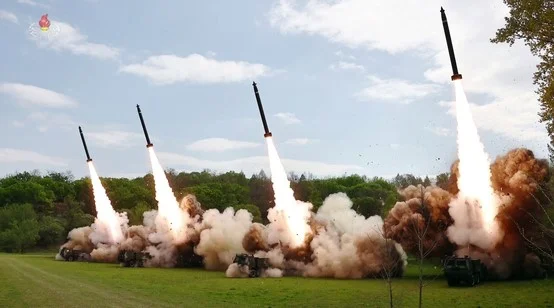 |
2024-04-29 | 1808 |
| 59 |
 |
2024-04-28 | 4165 |
| 58 |
 |
2024-04-27 | 4178 |
| 57 |
 |
2024-04-26 | 4317 |
| 56 |
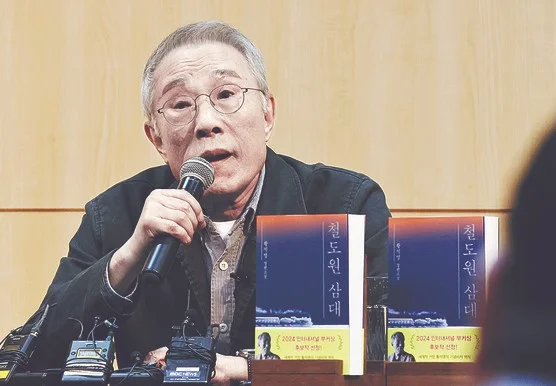 |
2024-04-25 | 4201 |
| 55 |
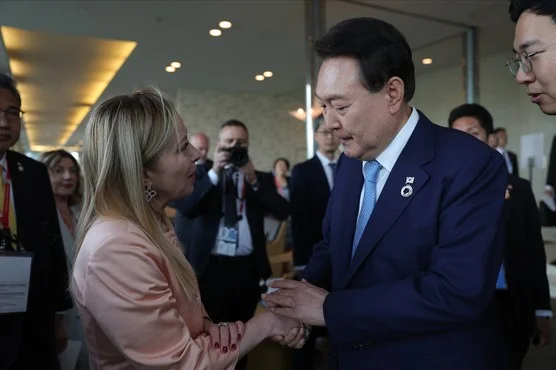 |
2024-04-24 | 4404 |
| 54 |
 |
2024-04-23 | 4368 |
| 53 |
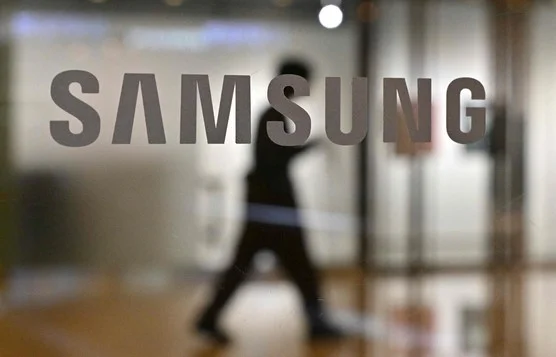 |
2024-04-22 | 4282 |



















